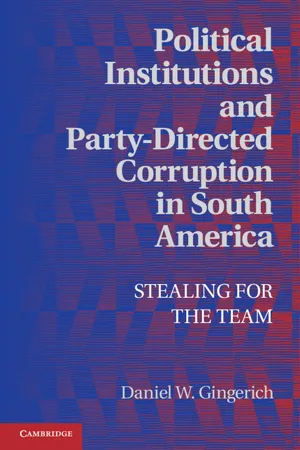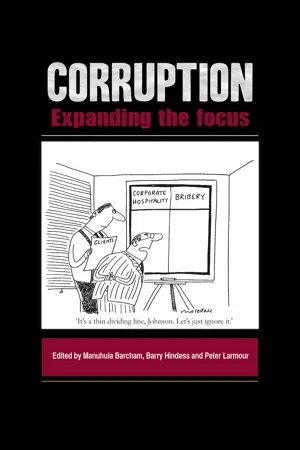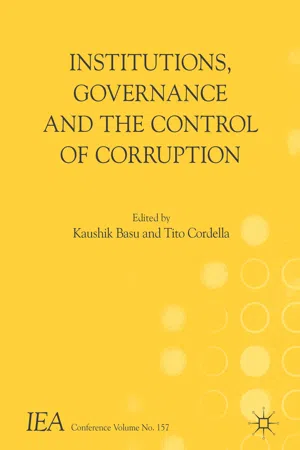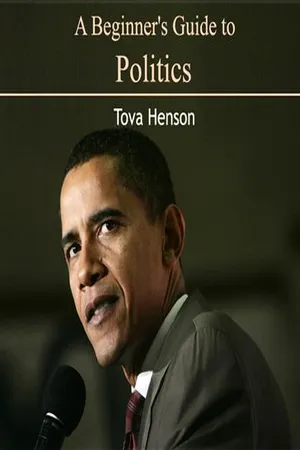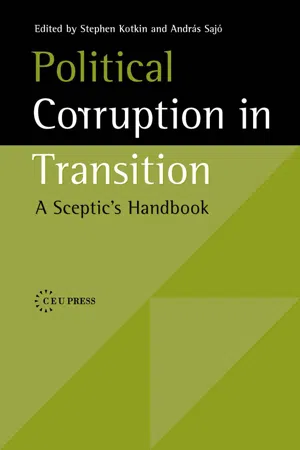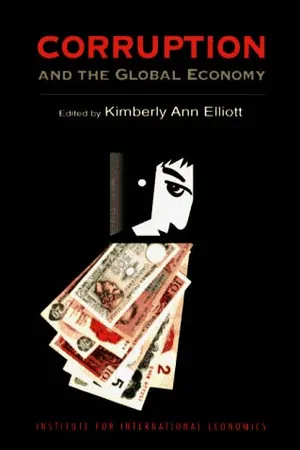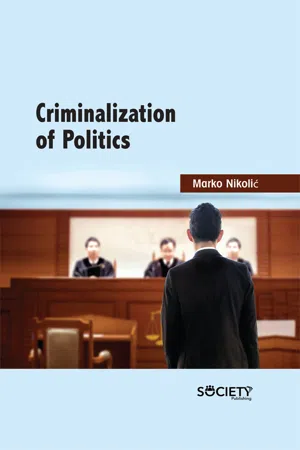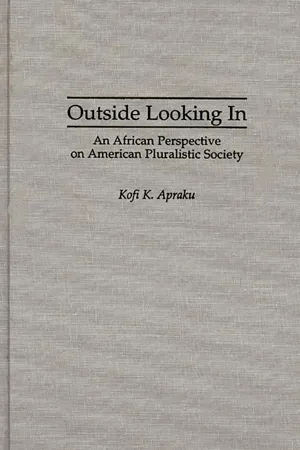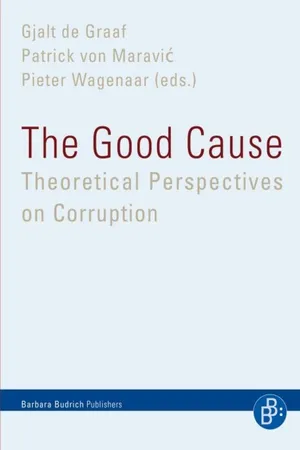History
Political Corruption
Political corruption refers to the abuse of power by government officials for personal gain or to benefit a particular group. This can include bribery, embezzlement, nepotism, and other unethical practices. Throughout history, political corruption has been a persistent issue, often leading to public distrust in government institutions and undermining the democratic process.
Written by Perlego with AI-assistance
Related key terms
1 of 5
10 Key excerpts on "Political Corruption"
- eBook - PDF
Political Institutions and Party-Directed Corruption in South America
Stealing for the Team
- Daniel W. Gingerich(Author)
- 2013(Publication Date)
- Cambridge University Press(Publisher)
Rather, these cases have revolved principally around the exigencies of financing political activity – political campaigns and party operating expenses – and the degree to which the assets or power of the public administration has been used to cover such expenses. Not only does a focus on pecuniary gain paint an incomplete picture of the type of behavior one might reasonably consider corrupt, but it also misses the central component of much of this behavior. A general definition of corruption should be expansive enough to cover activity oriented toward personal enrichment as well as activity oriented toward political advancement. Herein corruption is defined as behavior on the part of public officials, elected or nonelected, that advances either an individual’s or group’s financial well-being or a political goal through the misuse of the authority or resources of an official position. Conceived of in this way, corruption can be disaggregated into two com- ponents: personal corruption and Political Corruption. Personal corruption simply refers to the first part of this definition: the abuse of public office for the economic benefit of the officeholder and/or those close to him or her. Political Corruption refers to the second part of the definition: the abuse of public office to advance a political goal. More often than not, advancing a political goal entails using public resources directly or indirectly to support a particular candidacy, faction, party organization, or coalition. The lion’s share of examples discussed in this book consist of precisely such behavior. Note, however, that the definition is broader than this: using public monies without the necessary authorization to support foreign fighters engaged in a sympathetic cause would qualify, as would the misappropriation of funds from the defense budget to pay for school lunches. - eBook - PDF
Corruption
Expanding the Focus
- Manuhuia Barcham, Barry Hindess, Peter Larmour, Manuhuia Barcham, Barry Hindess, Peter Larmour(Authors)
- 2012(Publication Date)
- ANU Press(Publisher)
Rather than a self-evident category of conduct, corruption is a political concept whose parameters are set by an implicit vision of what the political realm actually is. It will be argued in this chapter that the concept of corruption has played an important role in Western political thought in helping to define the nature of politics itself. Over time, however, the conceptual contours of corruption have shifted, as have the ideas of politics with which corruption is entwined. In medieval political thought, corruption was a term used to trace the ‘health’ of the community to its moral qualities, and especially to the emulation of virtue among its members. A new language of politics began to emerge in parts of Europe in the seventeenth and eighteenth centuries, partly in response to the growing influence of commerce and trade (Hirschman, 1977, pp. 39–40). In this new language, the polity came to be conceived as an artefact of governmental activity premised on the separation of public and private interests. Importantly, this meant that the ‘political health’ Corruption: Expanding the focus 74 of the polity was not held to depend on virtue (or ‘political disease’ on vice), but on the governmental management of separate but interdependent political, social and especially economic realms (Doyle, 2004, pp. 86–7, 93–4). In tracing this shift, corruption emerges as a very elastic term but an important indicator of the development of early modern European political thought. The moral physics of corruption It is a commonplace of the literature on corruption that modern usage of the term to denote the use of public office for private (pecuniary) gain has substantially changed from ancient Greek and medieval usages. In ancient Greek thought, Euben (1989) maintains, corruption was understood to refer to the process and effects of change, but specifically denoted decay or degeneration. - Kaushik Basu, Tito Cordella, Kaushik Basu, Tito Cordella(Authors)
- 2018(Publication Date)
- Palgrave Macmillan(Publisher)
Corruption hurts life outcomes in a wide variety of ways. Economically, it diverts resources away from their most productive uses, and acts like a regressive tax that supports the lifestyles of elites at the expense of everyone else. Corruption incentivizes the best and the brightest to spend their time gaming the system rather than innovating or creating new wealth. Politically, corruption undermines the legitimacy of political systems by giving elites alternative ways of holding on to power other than genuine democratic choice. It hurts the prospects of democracy when people perceive authoritarian governments performing better than corrupt democratic ones, and undermines the reality of democratic choice.However, the phenomenon labeled corruption comprises a wide range of behaviors whose economic and political effects vary greatly. It is remarkable that for all of the academic effort put into the study of corruption, there is still no broadly accepted vocabulary for distinguishing between its different forms. Before we can tackle corruption, we need some conceptual clarity as to what it is, and how it relates to the broader problem of good government.Corruption as a Modern Phenomenon
Corruption can exist in many contexts, from bribery in a sports organization to a secretary stealing from the office pool. I am here going to focus on Political Corruption, which concerns the abuse of public office for private gain.1The first point to note is that corruption is a modern phenomenon. The very terms public and private did not always exist in earlier historical times. In the European Medieval era, virtually all regimes were what Max Weber labeled “patrimonial”: that is, political authority was regarded as a species of private property which could be handed down to descendants as part of their patrimony. In dynastic times, a king could give away an entire province with all of its inhabitants to his son or daughter as a wedding present, along with all of the inhabitants living there, since he regarded his domain as a private possession. Under these circumstances it made no sense to talk about public corruption.2- No longer available |Learn more
- (Author)
- 2014(Publication Date)
- The English Press(Publisher)
________________________ WORLD TECHNOLOGIES ________________________ Chapter- 6 Political Corruption World map of the 2010 Corruption Perceptions Index by Transparency International, which measures the degree to which corruption is perceived to exist among public officials and politicians. High numbers (blue) indicate less perception of corruption, whereas lower numbers (red) indicate higher perception of corruption. Political Corruption is the use of legislated powers by government officials for illegitimate private gain. Misuse of government power for other purposes, such as repression of political opponents and general police brutality, is not considered Political Corruption. Neither are illegal acts by private persons or corporations not directly involved with the government. An illegal act by an officeholder constitutes Political Corruption only if the act is directly related to their official duties. Forms of corruption vary, but include bribery, extortion, cronyism, nepotism, patronage, graft, and embezzlement. While corruption may facilitate criminal enterprise such as drug trafficking, money laundering, and human trafficking, it is not restricted to these activities. The activities that constitute illegal corruption differ depending on the country or jurisdiction. For instance, certain political funding practices that are legal in one place ________________________ WORLD TECHNOLOGIES ________________________ may be illegal in another. In some cases, government officials have broad or poorly defined powers, which make it difficult to distinguish between legal and illegal actions. Worldwide, bribery alone is estimated to involve over 1 trillion US dollars annually. A state of unrestrained Political Corruption is known as a kleptocracy, literally meaning rule by thieves. Effects Effects on politics, administration, and institutions Detail from Corrupt Legislation (1896) by Elihu Vedder. Library of Congress Thomas Jefferson Building, Washington, D.C. - eBook - PDF
Political Corruption in Transition
A Sceptic's Handbook
- András Sajó, Stephen Kotkin, András Sajó, Stephen Kotkin(Authors)
- 2002(Publication Date)
- Central European University Press(Publisher)
I want to discuss two. The first applies the defi-nition of Political Corruption to the matrix to ask how far all these forms of activity might, in a consolidated democratic regime, be recognizably corrupt; but the second raises the problem of states where a critical level of political viability has not been crossed. Broadly speaking, individual actions which subvert the electoral process or attempt to gain control over policy or decisions by the use of illegitimate inducements or threats, will count as corrupt wherever a pub-lic official is involved, and where we can establish the triadic relation-Bribery, campaign funding, buying votes Electoral malpractice Raising entry costs, exploiting access to TV, Media, etc. Funding of status quo or subversives Inducements and threats Patronage/ class rule Autocracy Exploiting dependency or venality Non-compliance/ free-riding Non-cooperation/ class war Elision of formal controls Covert support for one or more of the above I NDIVIDUALS F ACTIONS /C LASSES B UREAUCRATS /E LITE F OREIGN P OWERS E LECTORAL S UBVERSION C ONTROLLING P OLICY B LOCKING I MPLEMENTATION M ETHOD OF S UBVERSION A GENT OF S UBVERSION Political Corruption, Democratization, and Reform 67 ship, the illicit and personal gains to both sides, and the violation of pub-lic rules. Much the same can be said for the activities of factions or class-es—not least since a sufficiently stiff form of methodological individual-ism will reduce collective to individual agency. The situation regarding foreign power is similar, if more complex: similar, because it can be sub-jected to the same methodological reductionism, but more complex because of the various forms of influence which foreign states may seek to exert, the range of motives for accepting foreign support on the part of those holding public office, and the relative absence of a formal set of rules and norms in the international arena. - No longer available |Learn more
- Kimberly Ann Elliott(Author)
- 1997(Publication Date)
As for wealth and power, Huntington (1968, 59-71) has argued that where political opportunities exceed the economic, people are likely to use power to enrich them-selves; where economic opportunities exceed the political, people will tend to use wealth to buy political power. Particular combinations of imbalances among these forces give rise to characteristic corruption prob-lems that differ in their nature and political implications and point to political and economic reforms that can aid both democratization and anticorruption goals. Both kinds of balance are dynamic. They presume vigorous political contention. Where officials and private parties can influence each other but also resist exploitation by the other and where wealth and power interests are sufficiently balanced so that neither resource must chase the other, clear expectations and accepted rules governing relationships among them are more likely to be worked out. These rulesincluding boundaries and distinctions between state and society, public and pri-vate sectors, politics and administration, and individual and collective interests, and among market, bureaucratic, and patrimonial processes of allocationhave historically been drawn and have earned their legiti-macy through political contention. Where they and the politics that define them are absent, corruption is very difficult to define and control by means other than coercion (Johnston and Hao 1995; Johnston 1993). Looked at this way, democracyportrayed by the leaders of many coups dØtat as vulnerable to corruptionhas long-term anticorruption muscle. Ironically, coups against corruption, even if genuine in their intentand most are notpreempt the political contention that could eventually forge boundaries to contain it. Corruption begets bad politics, and bad politics begets further corruption. The sustainable democracy approach does not regard the state as a neutral referee or as a technical entity that merely processes demands from society. - eBook - PDF
- Marko Nikoli?, Marko Nikolić(Authors)
- 2020(Publication Date)
- Society Publishing(Publisher)
Criminalization of Politics 150 Figure 6.2: There are several laws that discourage corruption. Source: Image by Pixabay. The petty corruption is used and this includes bribes which are paid to enforcement officials, customs personnel, health service providers, and other government officials. Facilitation payments , which are commonly known as grease payments, fall under this category. There are some grand corruption which includes someone who misuses the opportunities which are assigned through government work, it can be higher-ranking government officials and elected officials. Thus, the consequence of bribes offered or paid in connection with large-scale government projects includes infrastructure and construction projects. Political Corruption is considered to be as grand corruption and the reason is its seriousness and the involvement of high-ranking public officials. It exists where trusted politicians and government agents with enforcing laws are themselves corrupt. It usually occurs at the top levels of government. There is another type of grand corruption and this includes State capture. This can be characterized as a company or organization which tends to shape and influence legislation The Culture of Corruption: Taking the World Back 151 or government policies in the whole sector (e.g., the extractive as well as mining industry or taxation) through payments. Contrastingly, there can be adverse effect wherein the public officials try to manipulate actors who are in the private sector for their gain, specifically known as reversed State capture. There is a not-so-distant equivalent of state capture which is known as influence corruption, and for them, actors, and goals is similar. The absence of any such payment, advantage, or transaction ever taking place brings a major difference. In this situation, influence is exerted on the basis of the ability of organization in order to impact policy. - eBook - PDF
Corruption and Government
Causes, Consequences, and Reform
- Susan Rose-Ackerman, Bonnie J. Palifka(Authors)
- 2016(Publication Date)
- Cambridge University Press(Publisher)
PART III CORRUPTION AS A POLITICAL PROBLEM 275 8 Politics, Corruption, and Clientelism Corruption describes a relationship between the state and the private sector. 1 Sometimes state officials are the dominant actors; in other cases private actors are the most powerful forces. The relative bargaining power of these groups determines both the overall impact of corruption on society and the distribu- tion of the gains between bribers and bribees. 2 Analysis of corruption is part of the ongoing and inconclusive debate about which form of government is most conducive to economic growth. Although wealthy countries do tend to be democracies, there is no simple statistical rela- tionship between growth and democratic government. 3 The reason for this is not difficult to fathom – “democracy” is simply too general a term to capture the range of government forms that come under that rubric. Furthermore, a govern- ment structure that works well in one country may be dysfunctional in another context. Widespread, entrenched corruption is one form of dysfunction. Is the establishment of democracy an anticorruption strategy? The desire for reelection constrains the greed of politicians. 4 The protection of civil 1 This chapter is derived, in part, from Coolidge and Rose-Ackerman (1997) and Rose- Ackerman (1998b). 2 As we discuss in previous chapters, sometimes private-sector agents accept bribes from other private entities. The underlying conditions are similar to the conditions that produce corruption in government, and with the privatization of some previously public activities, such corruption is likely to be of growing future importance. 3 Huber, Rueschemeyer, and Stephens 1993; Przeworski and Limongi 1993; Knack and Keefer 1997; Treisman 2000; Glaeser et al. 2004; Drury, Krieckhaus, and Lusztig 2006; Lederman, Loayza, and Soares 2006; Haque and Kneller 2009; Johnston 2012. - eBook - PDF
Outside Looking In
An African Perspective on American Pluralistic Society
- Kofi K. Apraku(Author)
- 1996(Publication Date)
- Praeger(Publisher)
Thus, an American president appoints people to positions not because they are from his tribe, but 84 Outside Looking In because they are his friends, brothers, relatives, and in many cases from his home state. Tribal politics? No, only regional politics! Crony politics? No, only Marcos had cronies; crony politics is practiced only in the underdeveloped world! Americans have been very innovative. By providing new names for known political abuses, politicians and the American public at large have deluded themselves into believing that they do not have any of the political problems in the developing countries - Political Corruption, nepotism, cronism, and many others. However, a survey of the facts shows otherwise. First, let's look at what Americans call lobbying. Lobbying is defined by my American Heritage dictionary as, "to seek to influence legislation." While lobbying may not in itself be considered a corrupt practice, the mechanism by which this influence is obtained generally borders on corruption. Lobbying has become the most powerful technique of interest groups ~ direct attempts to influence legislation and political elections through donations, contributions, and contacts with politicians. By so doing, the lobbyist attempts to "subvert" the political process and the "integrity of the politician." This is certainly one kind of corruption. In fact, my dictionary defines corruption as "an attempt to subvert or destroy the honesty and integrity of someone." As the two definitions of (lobbying and corruption) make clear, there may indeed be a fine line between lobbying and corruption of public officials. However, my observation is that the lobbyists have frequently crossed this line with impunity. Lobbyists have always operated in Washington, but they have never been as many and as influential, their activity so legitimized and their efforts so publicized. - Available until 15 Jan |Learn more
The Good Cause
Theoretical Perspectives on Corruption
- Gjalt de Graaf, Patrick von Maravic, Pieter Wagenaar, Gjalt de Graaf, Patrick von Maravic, Pieter Wagenaar(Authors)
- 2010(Publication Date)
- Verlag Barbara Budrich(Publisher)
Political economists with an institutional focus study such questions as the impact of bureaucratic reorganization on public performance, the effect of privatizing formerly public services, the relative merits of presidential and parliamentary democracies, and the role of inde-pendent courts, central banks, and regulatory agencies. They study both how people and firms respond to existing institutions as well as the political and economic incentives to change institutional forms (for overviews see, e.g., Mueller 2003; Weingast 2002; Weingast/Wittman 2006). Some of this analysis, both theoretical and empirical, discusses corruption along with other incentives to shirk through laziness or a desire for leisure or views it as part of the general tendency toward rent seeking in public life (North/Weingast 1989; North/Wallis/Weingast 2009). It asks how political incentives change with changes in government organization and studies how incentives and opportunities can lead to institutional change. However, cor-ruption is seldom the subject of detailed analysis. Recent work on corruption from a wider range of scholars is helping to remedy that lack, but it needs to be more closely integrated into the general fields of political economy and in-stitutional analysis (for one example of such an effort see Glaeser/Goldin 2006). The economic analysis of corruption models private individuals and firms outside government as active players. They do not passively vote for politi-cians, apply for public benefits, or bid for contracts. Rather they strategically interact with officials and politicians to further their own interests. Corrupt officials may pressure them for payoffs by, but they may also actively seek to subvert public programs to favor themselves. They may accept payoffs from politicians in return for their votes or pay politicians to get private benefits. The basic framework follows research on rent seeking in institutional eco-nomics but is more nuanced and complex.
Index pages curate the most relevant extracts from our library of academic textbooks. They’ve been created using an in-house natural language model (NLM), each adding context and meaning to key research topics.
